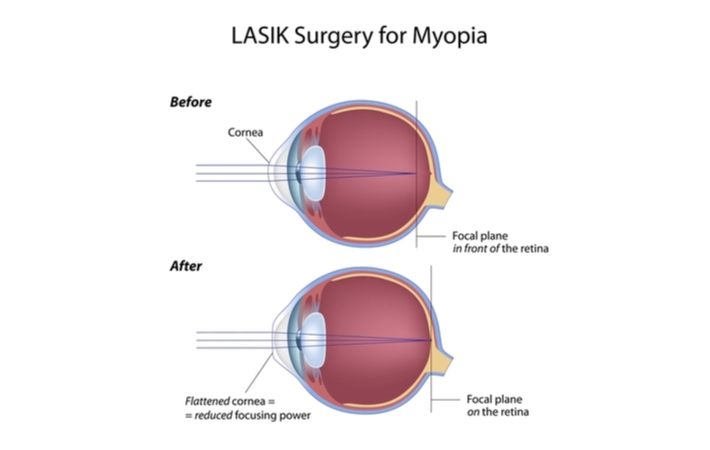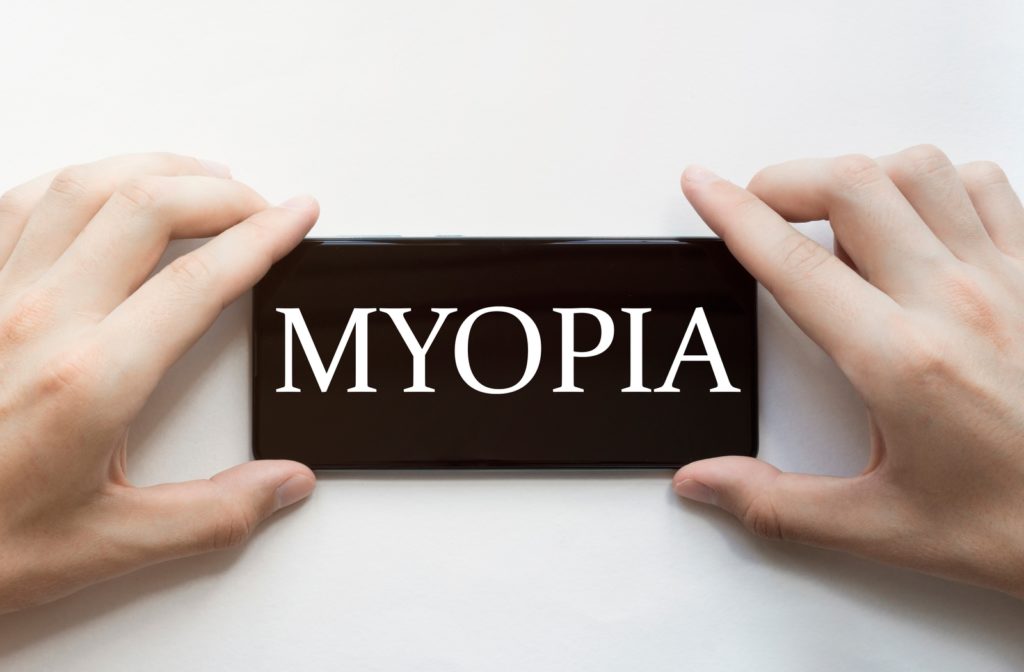For some, eyewear such as glasses and contact lenses can be annoying and cumbersome to deal with even though they might be necessary to help correct their refractive error. For those afflicted with a refractive error who do not wish to wear corrective eyewear, another option exists — LASIK eye surgery.
At Signature Eye Care, we offer effective laser eye surgery procedures that can help correct and treat refractive errors like myopia. Please contact us to book a consultation if you are curious about what LASIK surgery can do for your vision.
What is Refractive Surgery?
Refractive surgery is a procedure that is designed to improve vision by correcting refractive errors such as myopia, hyperopia, astigmatism, or presbyopia. There are various types of surgery that correct or adjust your eye’s focusing ability by reshaping the cornea — other refractive surgery procedures involve implanting a completely new, artificial lens inside your eye. The most common type of refractive surgery is LASIK, which involves a laser reshaping the cornea.
Am I a Candidate For Refractive Surgery?
There are some specific requirements that you must meet to ensure that you are an appropriate candidate for refractive surgery. If you are considering refractive surgery, the basic requirements are:
- You are 18 years or older (although, waiting until your vision has stopped changing is more ideal).
- Your eye prescription has not changed much in the last 2 years.
- You must have overall good eye health
- You need a thick enough cornea to sustain the procedure.
If you have certain eye conditions or diseases, a severe refractive error, dry eye disease, or are pregnant or nursing, you may not qualify for refractive surgery and should seek other correctional methods.
What is LASIK Surgery?
LASIK is a type of refractive surgery that utilizes a laser to correct and treat refractive errors. A refractive error occurs due to your eye not refracting light correctly, which can make viewing the world at certain distances blurry and difficult.
Your retina converts light into signals that your brain can understand. When a refractive error is present, light rays do not converge properly on your retina because of the irregular shape of your cornea or lens — rather, the light rays that enter your eye will converge at a point before or behind your retina.
LASIK surgery is designed to change the shape of your cornea. LASIK will improve the way light rays focus on the retina, and deter or eliminate the need for glasses, contact lenses, or other eyewear depending on the severity of your current refractive error. The overall goal when undergoing LASIK surgery is to correct your refractive error and improve your vision.

Does LASIK Surgery Fix Myopia?
LASIK surgery is mainly considered as an option to correct one of these vision problems:
- Myopia (nearsightedness) — Physiologically, this is when your eyeball is slightly longer than normal or your cornea curves too sharply. This causes light rays to converge in front of the retina, which in turn means that you can see objects that are close fairly clearly, but not those that are far away.
- Hyperopia (farsightedness) — This is when you have a shorter eyeball or a cornea that is too flat, which causes light to focus behind the retina. This makes near vision, and in some contexts distant vision, blurry.
- Astigmatism — This condition occurs when your cornea curves or flattens unevenly, and can disrupt the focus of near and distant vision.
If you are receiving LASIK surgery to correct myopia, the process of your surgery will aim to reduce the curvature of your cornea so it is less steep, and in turn, your eye’s focusing power will be lessened. Light rays that used to converge in front of the retina, due to a longer than average eye or a steeply curved cornea, will now be pushed to converge directly on the retina.
What is the LASIK Surgery Procedure?
Before your surgery beings, you will undergo an extensive evaluation session overviewing your general health and eye health. LASIK surgery is usually completed in 30 minutes or less. When starting the procedure, you will be lying on your back in a reclining chair and you may request to be given medicine to help relax. Once you are comfortable, the procedure will begin:
- Numbing drops will be placed in your eye and your doctor will use an instrument to hold your eyelids open.
- A suction ring will be placed on your eye just before cutting the corneal flap. This may cause a feeling of pressure, and your vision may dim a little.
- Your eye surgeon will use a small blade or cutting laser to cut a small flap away from the front of your eye — folding back the flap will allow your surgeon to access the part of your cornea that is to be reshaped.
- Using a programmed laser, your eye surgeon will reshape the necessary parts of your cornea.
- After reshaping the cornea, your surgeon will la the flap back into place. The flap usually heals without needing stitches.
- During the surgery, you will be asked to stare at a point of light — focusing on this light will help you keep your eye fixed in place while the laser reshapes your cornea.
- If you have requested to receive LASIK surgery in both eyes, your surgeon will generally conduct the procedure for both eyes on the same day.
LASIK Surgery at Signature Eye Care
If you are curious about receiving LASIK surgery, the Lincoln optometrist team at Signature Eye Care is always available to answer any of your questions, concerns, and inquiries. Book an appointment today for a laser eye surgery consultation — our knowledgeable doctors can walk you through the process of the surgery and discern whether or not you are an appropriate candidate for LASIK.



